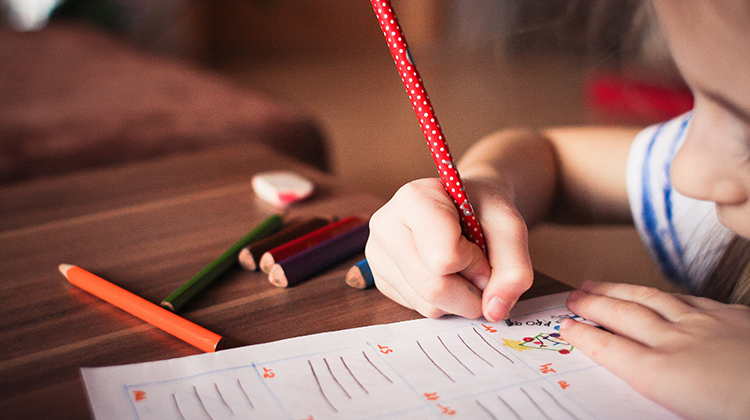We've been given a once-in-a-lifetime opportunity to reimagine education

At its peak, schools in more than 188 countries closed their doors in response to the COVID-19 pandemic. This impacted about 91% of enrolled students, or around 1.9 billion children. Many were out of school for months – and some still are.
As we approach World Children’s Day, it is a good time to consider how our children were affected by this period of disruption, and how we may be able to improve educational equity as a result of the hard lessons learned.
The impact of school closures on our most vulnerable children
It is widely known that school closures have had an impact on all students. But it’s the most vulnerable children – including those from low-income and single-parent families; immigrant, refugee, ethnic minorities and Indigenous backgrounds and those with special education needs – who really suffer.
With ongoing disruptive closures, and without access to the additional support and structures that school-based learning offers, these children risk falling further behind and becoming socially isolated. Additionally, growing evidence reveals that disadvantaged and vulnerable students, on average, are significantly less engaged with remote learning. That means there’s a double layer of concern – both social and academic – for these children.
Supporting Educational Equity During COVID-19 Closures
Many countries quickly recognised that a shift to remote learning wouldn’t work for all – and that their most vulnerable children would likely be disadvantaged by the rapid change in approach. Many pivoted quickly by offering additional support, sometimes taking creative approaches, to support educational equity. These strategies have included:
- Distributing free electronic devices to allow all students, even those without devices, to continue learning
- Offering subsidised internet and/or distributing WiFi ‘dongles’ to families without consistent internet access to support their children’s remote learning
- Partnering with educational media and optimising online learning resources like Education Perfect’s learning toolkits and subject specific resources
- Producing and distributing ‘hard copy’ learning resources – work packets, textbooks and workbooks – for students without reliable access to internet and/or devices, or due to living in remote areas
- Continuing to offer school-based learning in some form for the most vulnerable children
- Making efforts to support parents and increase parental engagement in their child’s learning through school outreach and education programmes.
Many of the most effective strategies to improve educational equity and support vulnerable children involve new and often creative partnerships – schools collaborating with parents, businesses with schools, schools with governments – all working together to support children and families like never before.
Key Lessons Learned
For those countries still dealing with school closures and remote learning, UNICEF’s Innocenti Brief, published recently, summarises their top three recommendations:
- Use multiple delivery channels for remote learning – a mix of digital and non-digital to ensure that every child can access learning in some way, regardless of wealth, location or family situation.
- Strengthen the support of teachers, parents and caregivers who deliver remote learning. This doesn’t just mean helping them to support their child’s academic progress, but also supporting their emotional and social well-being too.
- Constantly gather feedback and make changes in response. The format doesn’t matter too much – but the process does. Whether schools are asking for parental feedback via SMS or WhatsApp, email or through Teams conferences, it is imperative to regularly ‘pulse check’ what is working and what isn’t so that rapid improvements can be made.
But – what’s next?
Returning to on-campus learning is not an immediate panacea for all children.
There is the obvious issue of academic gaps. Not all children will have accessed or engaged with remote learning in the same way, nor received the same amount of support at home. For many students, this means they’ll be returning to school with gaps in knowledge and skills that may impact their ability to succeed academically in the months and years to come.
Schools are considering a variety of different approaches to support students, including highly differentiated teaching, additional support classes and learning clubs, and personalised learning plans. They’re having to adjust to not only the academic expectations for this year, but for the expectations spanning the next several years.
And perhaps even more concerning – and immediately pressing – are the significant mental health, isolation and disengagement issues that so many children are experiencing. These are not going to disappear when children return to campus; in many cases, the sudden shift back to a routine that no longer feels ‘normal’ may exacerbate these problems.
Thankfully, many schools are aware of these issues and are already planning new strategies in place to support students’ well-being when they return to school – including mental health assessments, hiring additional medical staff and counsellors, and special support measures for the most vulnerable.
Key Takeaways
The learning disruptions caused by COVID-19 have a huge silver lining: a once-in-a-lifetime opportunity to reimagine and rebuild our educational systems to better serve our children. We may never get this opportunity again.
The extra mental health and well-being support, creative partnerships between businesses and governments to improve educational equity, the additional funding to close learning gaps – why can’t these things stay?
Why can’t we commit to keeping the highest-impact strategies to ensure that all children have every opportunity to flourish, academically, socially and emotionally?
We have learnt so much.
Let us hope that governments around the world take advantage of this new knowledge, so that our children are better equipped to face change.
Helen Prior has spent the last 14 years in education, 12 of those in teaching and leadership roles in top-performing schools in New Zealand, Dubai, Hong Kong and Malaysia. Helen has particular interests in curriculum design, change management and collaborative leadership. Underpinning all of this is a passion for student-focused decision making across all aspects of education.